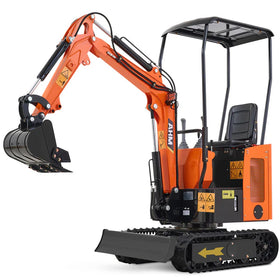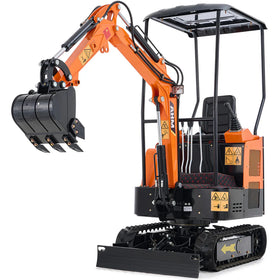Hydraulic oil is not exactly the same as hydraulic fluid, nor is it the same as jack oil, and this matters, especially when you own expensive "hydraulic equipment" like a mini excavator.
- Most people grab whatever's cheapest, not realizing that using the wrong fluid can destroy the $2,000+ hydraulic pumps in mini excavators.
- Others pay premium prices for "specialty" fluids when basic hydraulic oil would work perfectly fine.
The difference between protecting your hydraulic system and accidentally destroying it comes down to understanding all the differences between hydraulic oil and hydraulic fluid.
Understanding Hydraulic Oil vs Hydraulic Fluid Basics
The terms hydraulic oil and hydraulic fluid get tossed around interchangeably, but there are differences between them that can affect your equipment's performance and longevity.
According to machinery lubrication specialists, choosing the wrong viscosity grade is the single most common mistake that destroys hydraulic components faster than they should fail.
What is Hydraulic Oil?
Hydraulic oil is a specific type of fluid designed for power transmission in hydraulic systems. Technical data from Crown Oil shows that 99% of industrial hydraulic oils are mineral-based, derived from crude oil, and enhanced with specific additives to enhance performance.
Composition of hydraulic oil:
- Base oil: Refined petroleum products
- Anti-wear additives: Protect hydraulic pumps and components from metal-to-metal contact
- Anti-oxidation compounds: Prevent fluid breakdown under high temperatures
- Corrosion inhibitors: Protect metal surfaces from rust and degradation
- Viscosity improvers: Maintain consistent flow characteristics across a wide temperature range
Primary uses of Hydraulic Oil:
- Industrial hydraulic systems that require consistent pressure and flow
- Mobile equipment, including excavators, loaders, and farm machinery
- High-pressure applications that demand anti-wear protection
- Systems operating in extreme temperatures
What is Hydraulic Fluid?
Is hydraulic fluid the same as hydraulic oil? Not exactly. Hydraulic fluid is the broader category that includes everything from hydraulic oils, water-based fluids, and synthetic alternatives designed for specific applications.
Types of hydraulic fluid:
- Mineral-based fluids: Traditional petroleum-derived hydraulic oils
- Water-based fluids: Used in applications requiring fire resistance
- Synthetic fluids: Engineered for extreme temperatures and performance
- Biodegradable fluids: Used for environmental applications where spills could contaminate soil
Primary uses:
- Aircraft systems using specialized aviation hydraulic fluids
- Automotive systems, including power steering and brake systems
- Marine applications that require corrosion-resistant formulations
- Food-grade applications using approved synthetic fluids
Is Hydraulic Oil The Same as Hydraulic Fluid?
Hydraulic oil is a specific type of hydraulic fluid, but not all hydraulic fluids qualify as hydraulic oil. This will matter when selecting fluids for specific equipment.
For example, mini excavators require hydraulic oil with anti-wear properties, while automotive jacks may work with various hydraulic fluids. Using the wrong type will not only void the warranty but may also lead to expensive failures.
| Feature | Hydraulic Oil | Hydraulic Fluid |
| Composition | Specifically, petroleum or synthetic-based | Includes water-based and other specialty formulations |
| Purpose | Primarily for mechanical power transmission | Broader use, including power transmission and other applications |
| Viscosity | Typically ISO 32-68 | Varies widely depending on the specific fluid and application |
| Additives | Contains anti-wear additives | Some formulations may not contain additives |
What is Jack Oil?
Jack oil is typically a lightweight hydraulic fluid that has been specifically formulated for simple lifting applications. According to Practical Machinist forum discussions, Jack Oil packaged for automotive use is usually low viscosity, equivalent to that of SAE 10 motor oil.
Characteristics of Jack Oil:
- Low viscosity: Usually ISO 22-32 for easy flow in simple hydraulic cylinders
- Minimal additives: Only contains Basic anti-rust and anti-oxidation properties
- Cost-optimized: Cheaper formulation for low-pressure, intermittent use applications
- Temperature range: Limited performance in extreme hot or cold conditions
Typical applications:
- Automotive floor jacks and bottle jacks
- Simple hydraulic presses and lifting equipment
- Low-pressure cylinders under 1,500 PSI
- Intermittent-use equipment not requiring high performance
Is Jack Oil The Same as Hydraulic Oil?
Jack oil is a simplified hydraulic fluid, but it lacks the anti-wear additives and performance characteristics required for high-pressure hydraulic systems like those in mini excavators.
Main differences:
- Additives: Jack oil has minimal additives vs. comprehensive anti-wear systems in hydraulic oil
- Pressure ratings: Jack oil is designed for under 1,500 PSI vs. hydraulic oil for 3,000+ PSI systems
- Temperature stability: Jack oil has limited thermal stability compared to hydraulic oil specifications
- Filtration requirements: Jack oil doesn't need fine filtration, while hydraulic oil must maintain cleanliness standards
Hydraulic Oil vs Hydraulic Fluid vs Jack Oil Comparison
| Type | Description & Use | Key Characteristics |
| Hydraulic Oil | Petroleum or synthetic-based fluid for high-pressure power transmission systems | ISO 32-68 viscosity grades; anti-wear additives; operates 1,500-5,000+ PSI; better thermal stability |
| Hydraulic Fluid | Umbrella term including oils, water-based, and synthetic fluids | Variable viscosity; may lack anti-wear additives; includes specialty formulations for specific applications |
| Jack Oil | Lightweight fluid for simple lifting equipment and automotive jacks |
ISO 22-32 low viscosity; minimal additives; designed for intermittent use under 1,500 PSI |
What Hydraulic Fluid Does Your Mini Excavator Need?
Mini excavators require proper hydraulic oil - not generic hydraulic fluid or jack oil. According to technical specifications from Boleo, most compact excavators require ISO 46 hydraulic oil with anti-wear additives when operating above pressures of 3,000+ PSI.
Mini excavator requirements:
- ISO 46 viscosity grade for most operating temperature ranges (-10°F to 100°F)
- Anti-wear additives are essential for pump and cylinder protection under high pressure
- Thermal stability to maintain properties during continuous operation
- Filtration compatibility for fine hydraulic filters that protect sensitive components
Common mistakes that damage mini excavators:
- Using Jack oil in high-pressure hydraulic systems can cause pump failures
- Mixing different fluid types creates chemical incompatibility
- Wrong viscosity grades cause cavitation and wear on components
AHM Mini Excavators: Built for Proper Hydraulic Fluid Management
AHM AX-12 - $6,199.99
The AX-12 features advanced hydraulic systems designed for optimal performance and easy maintenance. Built-in hydraulic monitoring ensures proper fluid levels and temperature control for maximum system life.
- The enhanced boom design provides superior reach while maintaining precise control.
- With a 2,227 lb operating weight and 73-inch dig depth, the AX-12 requires ISO 46 hydraulic oil for its enhanced hydraulic system.
The 13.5 HP Briggs & Stratton engine drives the hydraulic pump that operates at an impressive 2,585 lbf digging force.
2. AHM AX-16 - $8,099.99
For operators requiring maximum hydraulic performance, the AX-16 comes with a commercial-grade fluid management system, along with enhanced durability features that protect hydraulic components from contamination and wear.
The 23 HP engine generates 3,262 lbf digging force through a sophisticated hydraulic system operating at 3,000+ PSI.
3. AHM AX-17 - $12,499.99
Built for serious excavation work, the AX-17 features the most sophisticated hydraulic system in its class. The 88.9-inch dig depth and 2,923 lbf digging force demand maximum hydraulic performance from ISO 46 oil.
Operating at 3,651 lb weight with zero tail swing, the AX-17 is built to deliver the best performance you can get at this price point.
The Bottom Line
Hydraulic oil vs hydraulic fluid isn't just about terminology - it's about matching the right fluid to what your equipment requires. Mini excavators need proper hydraulic oil with anti-wear additives, not generic hydraulic fluid or lightweight jack oil that destroys expensive components.
AHM mini excavators come with proper hydraulic oil and built-in monitoring systems that take the guesswork out of fluid management, ensuring maximum hydraulic system reliability and performance no matter which model you pick.







